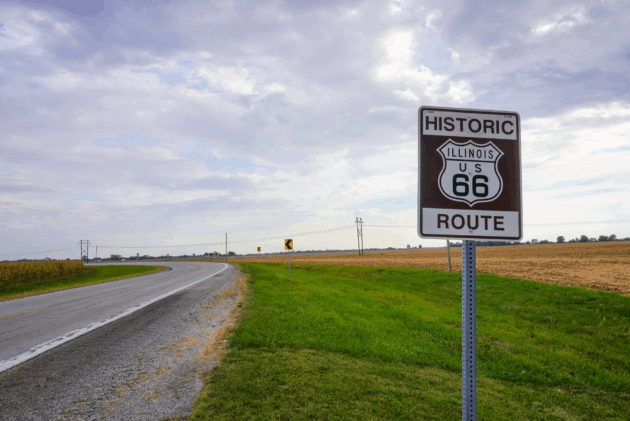
FCFI
August 31, 2025
Traffic is a funny thing. Back in the day, before the Interstate system, America drove the
backroads. Probably the most famous was Route 66 that stretched from Chicago to Los
Angeles and was lined with hundreds of mom-and-pop shops along the way.
Before that, we have old pictures of my wife’s great-grandparents traveling from Wisconsin to
California in a Model A. They picnicked along the roadside, and at night they stretched a canvas
from the roof of the car down over the car door and slept under there. They packed bread and
dried meat for lunches and suppers. The journey took a week or more, so planning and
preparation were essential. They carried tire-repair kits, too, because flat tires were as common
as potholes on a country road.
Once upon a time in my own lifetime, there was a guy on CBS named Charles Kuralt. He had a
show called On the Road with Charles Kuralt. He traveled the country in a motor home,
exploring lesser-known back roads and small towns. His stories focused on ordinary Americans’
quiet lives and honest work and moments of beauty often missed by the world at large.
When my wife and I lived in the city, we measured distance by minutes, not miles. It didn’t
matter how far away something was, what mattered was how many minutes it took to get there.
You’d pull onto a 12-lane freeway and hope to average 30 or 40 miles per hour. You had to learn
how to maneuver in six lanes of bumper-to-bumper traffic, all going the same direction. The key
was to stay calm. People would do stupid things and we came to expect it. And when you did
something stupid yourself, you’d hear horns honking, see some hand gestures, and probably
learn a few new curse words. Best to just let it go – it’s not worth the blood pressure spike.
One time, a buddy of mine had transmission trouble and needed a tow. I offered to tow him
myself instead of shelling out for a tow truck. Being a farm boy in the big city, I still had some
farmer-ingenuity in me. I hooked a tow rope from my back bumper to his front, and while he had
carefully planned a route through side streets, I suggested we take the freeway. He thought it
would be bumper to bumper. I said, “Perfect – no one will even notice I’m towing you.” I told him
to watch my brake lights and keep the rope tight when we slowed down. We hit 65 without
drawing any attention – just two cars in the flow. It worked like a charm.
Another time, we were at a busy intersection full of stoplights, turn arrows, and U-turns when a
woman’s car stalled right in the middle of it all. She sat there with her head on the steering
wheel, overwhelmed. People were cruelly honking and yelling at her. But some of us drivers,
coming from all directions, put on our hazard lights, got out, and pushed her car out of the mess
and into a nearby gas station. Before she even realized what was happening, we were back in
our cars and on our way. That was a good day.
I’ve never bought road hazard insurance for new tires. The way I see it, if I ever get a flat from
road debris, the money I’ve saved over the years will more than cover a new tire. That risk has
paid off. In over 50 years of driving, I’ve only had two flats caused by something on the road.
Once, between Phoenix and San Diego, I felt the right rear tire begin to thump. I took the
nearest exit, and a gas station attendant plugged the tire without even removing it from the rim.
Charged me five bucks. The other time was in Montana. I hit something that ruined the tire. I put
on the tiny spare and drove to the nearest shop, where they replaced it for free. It was a Cooper
tire, and apparently, they had some kind of lifetime guarantee.
Speaking of town and country, our daughter once brought a friend from Chicago out to visit our
farm. The girl had grown up with the bright lights of the city – streetlights, stoplights, traffic noise
24/7. When they turned off the main highway toward our place, they were met with pitch-black
night. No streetlights, no yard lights between homesteads, just open country. She started to
panic. They had to turn the dome light on inside the car to keep her from having a heart attack.
My wife and I have lived in both the big city and the country. We adapted well to both, and we’ve
enjoyed what each has to offer. But our hearts have always belonged to the country.
In the Bible, the countryside often represents a journey toward spiritual readiness, but the
destination is always God’s eternal city. Hebrews 11 says that Abraham looked forward to “a city
with foundations, whose architect and builder is God.” And in Revelation 21, it says that in God’s
eternal kingdom, “the kings of the earth will bring their splendor into” the New Jerusalem. Its
gates will never be shut, and there will be no night there. “The glory and honor of the nations will
be brought into it.”
Someday, I’d like a little corner of heaven out in the country where I can grow some of that glory
and honor to offer back to God.
(Kevin Cernek is Lead Pastor of Martintown Community Church in Martintown, Wisconsin where
he enjoys reading, writing, and teaching God’s Word).
